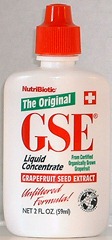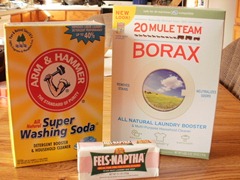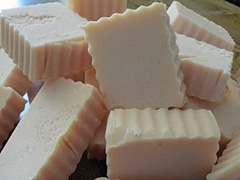Annie Jones, from Haphazard Homestead, is sharing frugal, green recipes for household cleaners, laundry soaps, and hand and bath soaps.
Going green and going natural doesn’t have to be an expensive venture when it comes to homemade soaps and cleaners. Whether it’s bath soap, laundry detergent or all-purpose cleaners, making these at home can be both frugal and fun. The biggest expense may be your time.
**********
Frugal all-purpose household cleaners go together quickly with just a few ingredients.
The simplest of these is simply vinegar and water. Vinegar is mildly disinfectant and safe for both people and pets, and is good for hard surfaces, glass and floors.
Vinegar and Water Cleaner: Simply mix 1 part white vinegar with 1 part water in a 32 ounce spray bottle. Use as you would any homemade spray cleaner. Suitable to be used on floors, glass and almost any hard surface.

Grapefruit Seed Extract All Purpose Cleaner: Add 30-60 drops of Grapefruit Seed Extract (GSE) to any 32 oz. pump sprayer filled with water or cleaner. Use on all surfaces around the house to disinfect, kill mold and add potency to your regular cleaning solution. Test a small area before applying to the entire area.
Sometimes a mild abrasive cleanser is in order. An effective solution is a simple paste of baking soda and liquid dish soap. The baking soda provides the mild grit, while the dish liquid cuts through grease, oils and soap scum. Rinse away the solution very well, especially in the bathtub, as it can be very slippery.
Safe Abrasive Kitchen and Bath Cleaner: Make a paste of baking soda and grease-cutting liquid dish detergent of your choice. Apply to surface with wet scrubby sponge. Rinse well.
Glass and other surfaces will sparkle with a solution of ammonia, rubbing alcohol, dish soap and water. It has a clean smell as it is, but will also accommodate essential oils or fragrance oils for a “designer” scent. This formula is my personal favorite, but if you are bothered by the small amount of ammonia in this solution, you can use vinegar instead.
Alcohol-Based All-Purpose Cleaner
Empty gallon
1/2 cup ammonia (or, alternately, 1/2 cup white vinegar)
16 oz. rubbing alcohol
1 tsp. grease-cutting liquid dish detergent
Essential or fragrant oil (optional)
Food coloring (optional)
Place ammonia, alcohol and dish detergent in a gallon jug. Slowly fill jug with warm water (the slower you fill, the less the suds will be a problem). Add a few drops fragrant oil and or food color if desired.
**********
Laundry detergent can be a big cleaning expense, but making your own at home requires just a few ingredients and can be other unscented or scented to your liking with essential oils. If you prefer a liquid form, it can be made at home as well. Homemade laundry soap is friendly to both the environment. Earlier this year, I mixed up a triple batch of the powdered version. For the approximately $10 I spent, I was able to do laundry almost daily for seven months.
1 bar Fels-Naptha soap* grated
1 cup Borax
1 cup washing soda
Combine all ingredients.
Store in an airtight container.
Use 1 Tablespoon of this mixture per load of laundry. If laundry is heavily soiled, use 2 Tablespoons per load.
I use my food processor to grate the bar soap, and I find that if I use both the shredding disk on top and the chopping blade in the bowl, I can grate the soap to a fine powder that mixes more easily with the Borax and washing soda.
Liquid Laundry Detergent:
1 bar Fels-Naptha soap* grated
1 cup Borax
1 cup washing soda
Combine the soap with 6 cups of water in a large pan. Heat until soap has melted. Add Borax and washing soda and stir until dissolved. Pour 4 cups hot water into a large pail (3 to 5 gallon capacity) and stir in the warm soap mixture. Add 5 quarts plus 2 cups (22 cups total) of water and stir well. Let sit 24 hours before using; the mixture will gel. Use ½ cup per load of laundry.
*All ingredients are available in the laundry aisle of most grocery stores, discount stores, at some full-line hardware stores and online. Instead of Fels-Naptha, you can use Ivory, Pure & Natural, Zote, homemade soap or any other all-natural or laundry bars as desired. Make sure you use washing soda and not baking soda, as they are not the same thing. While I have never made the liquid version of this soap, I am told it sets to a gel that is thin, rather than thick.
**********
Handmade cold-processed hand and bath soaps require an investment of time and a few basic utensils and ingredients. However, the process can be fun and even frugal if you make enough batches to recoup the cost of equipment. Perhaps the biggest advantage in making soap is in knowing exactly what is in your soap and being able to get away from the chemical additives in commercial bath bars. Homemade soap is normalizing, in that the same basic soap can help moisturize dry skin or clear oily skin. In my family’s experience, it also noticeably improves eczema.
Over time, soap making can be a rewarding hobby. It can become something of an art-form, as the combinations of oils, scents, colors, herbal additives, molds and milling techniques are virtually endless.
Because I’m a beginner to the soap making process, I am including just one basic recipe or formula here (one that has given me very nice results), then I will direct you to some websites and blogs for the actual process of making soap, which is the same, regardless of the ingredients and the amounts. The process requires time and care, and may seem daunting at first, but is actually not complicated at all.
Basic Handmade Soap
Ingredients:
810 grams (28.5 ounces by weight, not volume) olive oil
310 grams (10.9 ounces by weight) coconut oil
300 grams (10.5 ounces by weight) rice bran oil
80 grams (2.8 ounces by weight) peanut oil
570 grams (20.1 ounces by weight) water
213.5 grams (7.5 ounces by weight) lye
Essential oils for fragrance and soap dye for color – both optional
Follow the process listed HERE or HERE. Please pay special attention to all directions and safety tips.
**********
For further details and ideas on soap making, I’ve found the following books to be helpful:
The Complete Soapmaker by Norma Coney
Making Soap from Scratch by Gregory Lee White
Soap: Making It, Enjoying It by Ann Bramson
**********
I hope you will give some of these homemade soaps and cleaners a try. Even using just one will make your life greener and simpler. For me, they are definitely worth the time it takes to mix up a batch or two.
Annie Jones’ blog, Haphazard Homestead, focuses on the topics of food, gardening, sustainable living, home improvement and general life observations.
Annie lives in a suburb of Kansas City, MO, with her husband Shane, granddaughter Kat, and three cats.
This post is linked to Frugal Friday.



Desperate Houselife says
Thanks for stopping by my blog. I am loving the tips here, and especially the eco friendly recipes. I am pinning this one for sure. I am your newest follower as well! =D
Anonymous says
You can use the laundry detergent in a front-load washer, because it doesn't make a lot of suds, which causes problems for front-loaders.
I used that recipe before, and my hubby didn't like it. It can make whites a little dingy, but I think it's worth a try.
Phoebe @ Cents to Get Debt Free says
I've always wanted to make my own soap, but I can never find the right ingredients here. Maybe I should check online. Thanks for putting back in my mind!
Anonymous says
Can you use this laundry soap in a front loading washing machine?
Frances says
Great post from Annie Jones. She is really inspirational to those of us trying to be more frugal.
Shana says
I have been wanting to try to make my own laundry detergent but the only recipes I found were for these huge 5 gallon buckets and I don't have anywhere to put that so this is perfect. I would rather make the dry one too!!
Beth says
Love homemade soaps. Thanks for sharing. These are great and easy to use recipes.
Alea says
I never knew you could use lemons to remove water spots. Thanks for the tip!
Lynn says
Fun post! I have been wanting to try making homemade soap for ages but have not yet done it. I love the make-it-yourself cleaning ideas — I just discovered that white vinegar takes off hard water spots this last year. Who knew?! Also fun to use is little wedges of lemon after you've squeezed out the juice. It's not quite as strong as the vinegar, but it does a decent job at getting out those water spots from the sink. Thanks for this post; great ideas 🙂